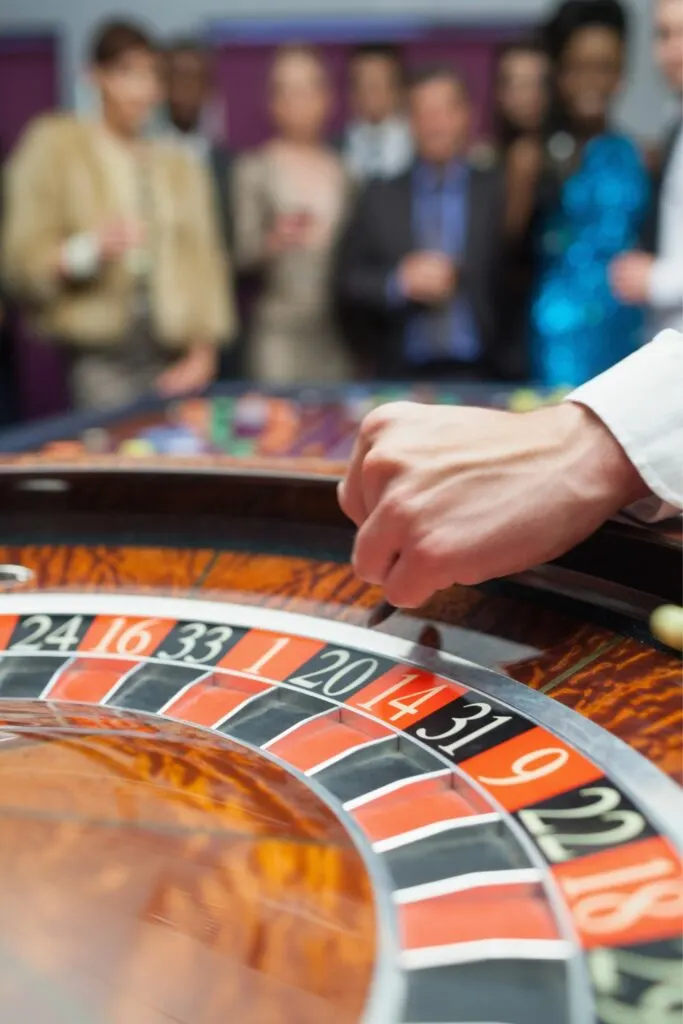As one of the most iconic games in a casino, roulette has captivated players for centuries. A key component of the game is the roulette dealer (also known as a croupier), responsible for spinning the wheel, calling bets, and paying out winnings.

If you’ve ever been drawn to the excitement and allure of the casino world, becoming a roulette dealer might just be the perfect career path for you.
Before diving headfirst into this profession, it’s essential to understand what the job entails and the steps required to succeed. To become a roulette dealer, you’ll need to complete specialized training, obtain proper licensing, and hone your skills through practice. Many casinos offer in-house training programs for new dealers, which can be an excellent way to kickstart your journey in the industry.
While learning the ins and outs of the game, aspiring roulette dealers will also need to develop the ability to quickly and accurately calculate payouts, as well as master the art of effectively managing the game flow. As a roulette dealer, your success will largely rely on your ability to provide a seamless and enjoyable gaming experience for casino patrons.

Understanding the Role of a Roulette Dealer
Roulette dealers, also known as croupiers, play a crucial role in the operation of casinos, ensuring that roulette games run smoothly and providing a positive gaming experience for players. This section will delve into the responsibilities and duties of a roulette dealer, as well as the skills and personal qualities required for this career.
Responsibilities and Duties
A roulette dealer has several key tasks to perform on a daily basis, including:
- Game management: Dealers are in charge of spinning the roulette wheel, releasing the ball, and announcing the winning numbers. They must also follow casino rules and procedures to ensure fair and efficient gameplay.
- Chip handling: Dealers must accurately stack, distribute, and collect playing chips, using mental arithmetic to calculate player winnings and ensure correct payouts. They should be able to handle 20 chips in one hand to enhance efficiency.
- Player interaction: Croupiers assist players in placing their bets, answer any questions about gameplay, and maintain a friendly and welcoming atmosphere at the table.
- Security and compliance: Dealers are responsible for spotting any suspicious activity or potential cheating and reporting it to their supervisor or casino security. They may also be required to undergo licensing procedures, including police background checks and credit checks, depending on the country in which they work.
Skills and Personal Qualities
To thrive as a roulette dealer, an individual should possess the following skills and personal qualities:
- Numeracy: Strong mental arithmetic skills are essential for quick and accurate payout calculations, as well as managing chips and bets.
- Dexterity: Dealers should be comfortable handling playing chips and managing the roulette wheel with precision and control.
- Communication: The ability to interact with players, answer their questions, and explain the rules of the game is vital. Good communication also helps create a positive gaming environment.
- Observation: A keen eye is necessary for spotting any irregularities or cheating attempts during the game.
- Patience: Dealing with many different types of players and keeping a level head despite potential high-pressure situations is essential.
- Adaptability: Dealers may need to adjust their techniques for different types of roulette games or casino environments.
Becoming a roulette dealer can be a rewarding and exciting career path in the casino industry, with opportunities for growth and advancement for those who excel in the role.

Getting Started in the Casino Industry
Education and Qualifications
To become a roulette dealer, it’s crucial to complete a reputable training program focused on casino games. You’ll learn about the rules, tools, and procedures of each game, local and state gambling laws, and required regulations. Look for a reputable casino training school or a casino offering on-the-job training to ensure that you receive the necessary education.
Considering Languages
As a roulette dealer, it’s essential to have excellent communication skills. If you plan on working in an international casino or a region with a diverse population, knowing multiple languages can be advantageous. Speaking several languages can also help you successfully interact with players and understand their needs, leading to a better gaming experience for everyone.
Obtaining a Gaming License
Before working as a roulette dealer, you must obtain a gaming license. The licensing process often involves credit checks and criminal background checks, ensuring that you meet the necessary requirements to work in the casino industry. Check with your local gaming authority or the casino where you plan to work for specific licensing requirements and procedures.
Developing the Necessary Skills
Becoming a successful roulette dealer requires a combination of technical and interpersonal skills. In this section, we’ll explore some essential abilities that you’ll need to develop to excel in this field.
Firstly, it’s crucial to have a thorough understanding of the rules of roulette. You’ll need to be able to swiftly and accurately handle the equipment, such as the roulette wheel, ball, and the table layout. It’s also essential to master picture bets, which are quick mental calculations of potential payouts based on the bets placed on the table. You can improve your math skills through practice and taking specific courses focused on casino-related mathematics.
Next, focus on enhancing your communication skills. A roulette dealer interacts with a varied range of people, making it necessary to maintain a friendly and engaging demeanor. Effective communication ensures an enjoyable gaming experience for all players.
Speed and flexibility in handling chips and managing the game are also vital. With experience, you’ll develop the ability to efficiently collect and distribute chips and payouts. When it comes to tips and techniques, a comprehensive training program will teach you efficient systems and practices. As recommended by Indeed, enrolling in a casino dealing training course is a great way to get started.
In the training program, you’ll learn about:
- Various roulette betting systems
- How to properly use the equipment
- Local and state gambling laws and regulations
- Efficient audience handling
Once the theory aspect of your learning is complete, you’ll need to gain practical experience. Many casinos require potential dealers to go through an audition process, where you showcase your newly acquired skills on the casino floor. This helps reinforce your training and gives you the necessary feedback on areas for improvement.
In conclusion, becoming a successful roulette dealer involves mastering technical and interpersonal skills. Focus on learning the rules, refining your math and communication skills, and undergoing practical training. With dedication and practice, you’ll be able to provide an enjoyable and professional roulette gaming experience for all players.
Job Prospects and Career Growth
Becoming a roulette dealer offers promising job prospects and career growth in the gaming industry. The overall employment of gambling services workers, including roulette dealers, is projected to grow 17 percent from 2021 to 2031, much faster than the average for all occupations. This is largely due to the increasing popularity of gaming and the legalization of gaming in more cities, states, and countries.
Roulette dealers in America earn an average salary of $41,357 per year, with the top 10 percent making over $72,000 per year. Apart from the income, other benefits include job security and opportunities for career advancement. However, it is worth noting that working as a roulette dealer might require unsociable hours, including night shifts, weekends, and holidays.
To become a casino dealer, you should complete a dealer school to learn about the local and state gambling laws and regulations, as well as the rules and procedures of different games. Training programs like these can help you pick up not only roulette dealing skills but also other games like mini-baccarat and carnival games. Remember that qualifications might vary between establishments, so it’s essential to check the specific requirements.
Language skills can be a valuable asset when working as a roulette dealer. Knowing Filipino, Spanish, Vietnamese, Mandarin, or any other languages can increase your employability and help you communicate with a diverse clientele.
Keep in mind that working as a dealer can be physically demanding, and you’ll need to stand for extended periods. Frequent breaks are often given to roulette dealers, allowing them to rest and refresh throughout their shifts.
In conclusion, pursuing a career as a roulette dealer can be a rewarding and exciting path. With opportunities for career advancement, a competitive salary, and job security, it’s a profession worth considering.
Life Beyond the Casino
As a roulette dealer, life beyond the casino can be quite exciting and full of opportunities. For starters, your skills as a dealer can be applied to other popular casino games like poker, blackjack, and craps, making you more versatile and valuable as an employee.
Working on cruise ships or in luxurious casinos in popular destinations can add a thrilling aspect of travel to your career. You can explore new places while also polishing your skills at the gaming tables. This can make for a fulfilling and interesting professional life.
When it comes to socializing, roulette dealers meet a diverse array of people from different backgrounds. This helps in improving communication skills and the ability to relate to others better. Being a dealer is not just about understanding the game – your customer service skills and a good appearance are equally important. With time, you develop confidence that will enhance your performance and boost your career growth.
As a casino dealer, it is essential to undergo a background check and maintain a clean criminal record. Casinos prioritize security to protect their customers, assets, and reputation. In addition, dealers should ensure their own personal security while handling casino chips and interacting with guests.
Working as a roulette dealer means adapting to different shift patterns. This can be challenging but also beneficial, as it allows for a more flexible schedule. Additionally, dealers enjoy certain perks like paid holiday that can provide a much-needed break from the gaming tables.
With the advancement in technology, the gaming industry has also expanded to online casinos. Live dealers are in high demand for online platforms, ensuring the authenticity of the gaming experience for players. Thus, expanding your skillset as a roulette dealer to adapt to this digital shift can lead to exciting new opportunities.
In summary, life beyond the casino for a roulette dealer can be a thrilling and fulfilling journey. Embracing new challenges, honing your skills, and maintaining a professional attitude will help elevate your career in the ever-evolving gaming industry.
Challenges and How to Overcome Them
Becoming a roulette dealer can be a rewarding career, but it comes with its unique challenges. In the casino industry, one major challenge faced by dealers is the need to balance technical skills with exceptional customer service. Developing a friendly and confident personality is essential for engaging with customers.
A great way to prepare for this role is by participating in a simulated casino environment where you can practice both dealing techniques and interaction with players. Additionally, learning multiple languages, such as Mandarin, Filipino and Vietnamese can be an asset in catering to a diverse clientele.
Casino dealers must also be vigilant in detecting and preventing cheating attempts by customers. Gaining a solid understanding of game rules and strategies can help you stay ahead of potential cheaters. Further, always adhering to rules and regulations set by the casino can ensure you maintain your integrity and professionalism on the job.
Another challenge may come in the form of machine malfunctions while dealing at electronic roulette tables. To overcome this, acquire knowledge on how to troubleshoot basic issues, and, if needed, work closely with the casino’s technical team to address more complex problems.
Obtaining a gaming license is also crucial for roulette dealers, as it provides legitimacy in the eyes of both employers and customers. Compliance with licensing requirements may include passing a drug test and criminal background check. Make sure to review your local jurisdiction’s guidelines and take any necessary steps to meet the licensing criteria.
In summary, conquering the challenges of becoming a roulette dealer involves honing technical skills, delivering excellent customer service, and adhering to casino regulations. With practice, perseverance, and a friendly demeanor, you can excel in this exciting career.
